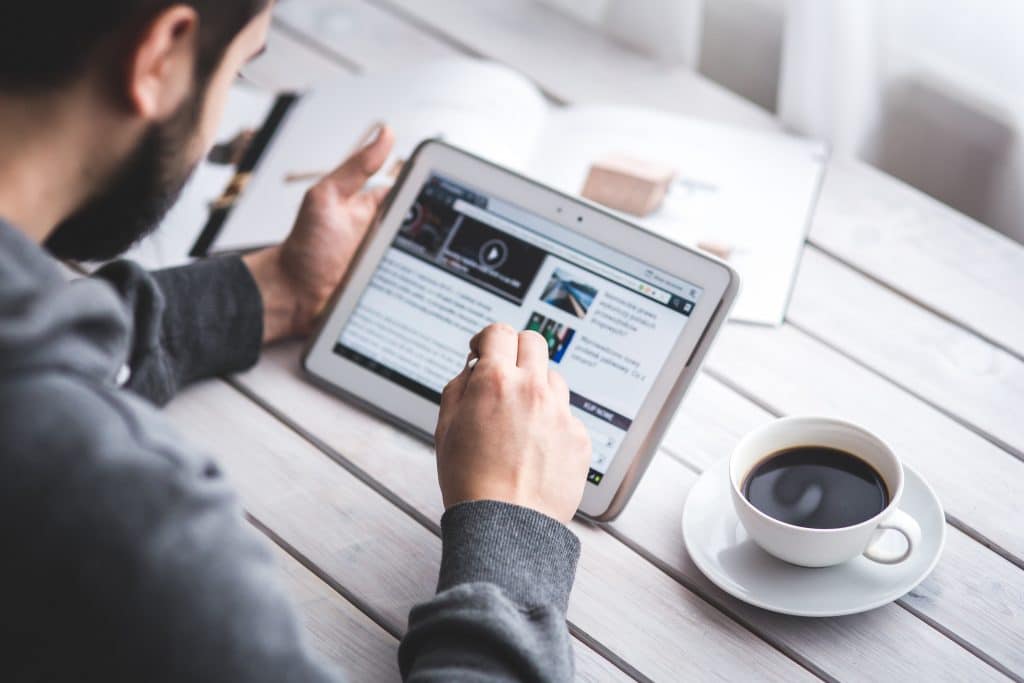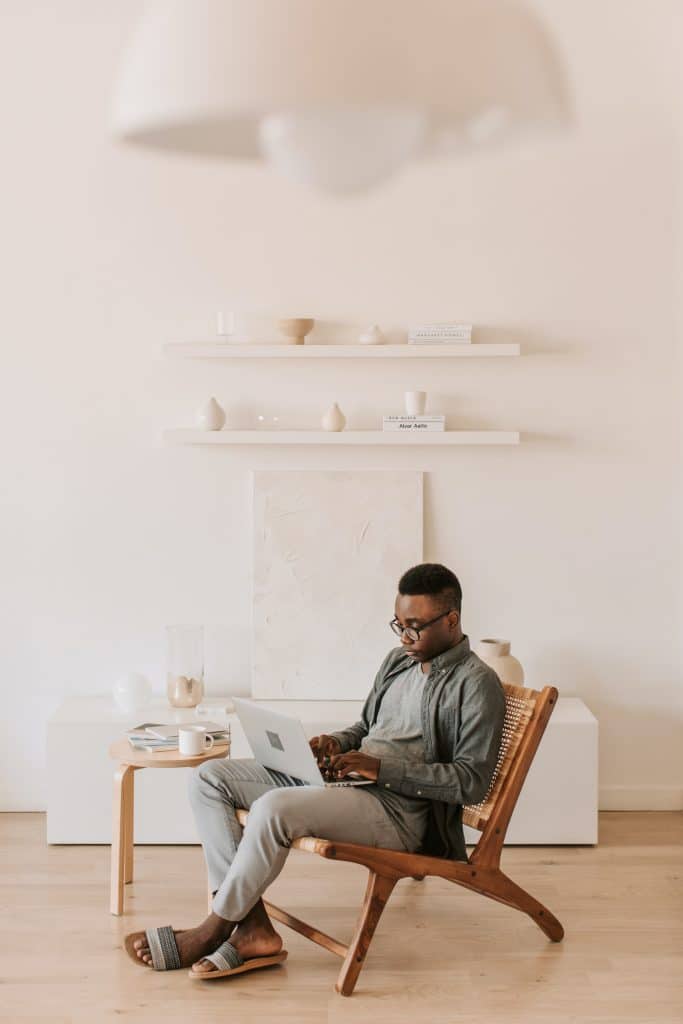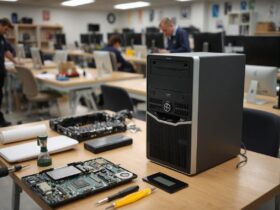There used to be no competition between a tablet and a laptop.
Before, tablets were only larger versions of your smartphone (some still are). Now, technology advancements have made tablets competitive in the laptop market as well.
With laptop/tablet hybrids on the market, consumers aren’t sure which is best for them. Truthfully, there’s no clear better option. It all depends on what your needs are.
In this article we’ll discuss tablet vs laptop, and which model might work best for you.
Pros and Cons of Tablets
Tablets are visually appealing with their big touch screens and color options. In many cases, tablets have great professional, personal, and even creative benefits.
Yet, tablets aren’t for everyone. Whether or not a tablet is for you depends on how you plan to use it.
Portability
Hands down, tablets are more portable than laptops.
They’re lightweight and small. Depending on the size of the tablet, they can weigh less than 1lb. One of the heaviest tablets comes in at 1.5lbs.

Tablets are small enough that they can fit in your purse or daily backpack easily and without adding much burden. Also, the charging cords for tablets are typically about the same size as your phone charger. This is unlike laptop chargers, which are often bulky.
If you regularly travel or hang out at coffee shops, then a tablet might be a good option for you.
Battery Life
Because of their smaller size and CPU processors, tablet batteries can run for longer than laptop batters. The average tablet battery span is 8-12 hours of use.
They use less battery power because they don’t have the same heavy processors as laptops and don’t get as heated. Tablet batteries are more like your cell phone battery than a laptop battery.
That’s not to say laptops can’t compete. Many of the newer laptops have battery lives that can last up to 12 hours in a power-saving mode.
If portability is a factor in your decision, then you’ll want a long-lasting battery, too.
Display
Laptops have larger screens that give them the upper hand with their display. Gamers, in particular, prefer laptops for their fast and clear graphics.
However, since tablets have smaller screens, they have higher pixel density. This makes them good for streaming movies and TV shows or scrolling social media.
Ultimately, price determines a lot about a tablet or computer’s display. If you’re on a budget and you’re looking for the best display for your money, then a tablet gives you more bang for your buck. A $150 tablet likely has a better display than a $150 laptop.

Camera
Since tablets are more like smartphones, they usually have better cameras than laptops. It makes sense that the more portable of the two would offer a better camera.
Also, tablets usually have front and back cameras, while laptops only supply a front camera. If you’re planning on using your laptop or tablet just for video conferencing, then the lack of a back camera shouldn’t matter.
However, if you want to use your device for selfies or pictures on the go, then a tablet has better camera options for you.
Accessories
One of the biggest appeals of tablets (other than their portability) is the bevy of customizable accessories.
For instance, you can personalize your tablet with colorful cases. Plus, tablets can now replace notebooks with super intuitive styluses that work just about the same as a pen and paper.
Artists and creatives like tablets for the versatility they offer in creative arts. If you’re interested in graphic design or digital art, then a tablet is a way to go.
Bluetooth keyboards make typing faster and easier on a tablet, but they’re smaller than average laptop keyboards. Many people don’t find them as comfortable. If a tablet is still appealing to you, make sure to test out different Bluetooth keyboards and try to find one that suits you.
Easy to Use
Children and adults less technically inclined find tablets easier to use than laptops. Tablets are set up straightforwardly. Touch the icon of the app you want to use.
Tablets are also helpful for people with vision impairment. Easy-touch zoom features make it easier to read small text in ebooks and websites.
Storage
Just as mostly cloud-based devices, tablets do not have much storage. The lack of storage is one of the things that allows them to be so portable and lightweight.
Tablets usually start with 8 GB of memory, and laptops start with 500 GB. If you want to add more memory to your tablet, then you’ll either have to pay for a more expensive tablet or have an external hard drive (which not all tablets are compatible with).
If you want something you can store pictures and documents on, then a laptop is probably a better option. It’s easier to store items directly onto your laptop or onto an external hard drive.
Price
Tablets can cost a lot less than a laptop, or they can cost just as much as a laptop. You can pick up a small, basic tablet for under $100. On the other hand, a more advanced hybrid tablet costs $800 to $1000, depending on how much storage you get.
The base price of a tablet is cheaper than a laptop, but remember to consider accessories. Often, the accessories for a tablet are what make it appealing. Make sure to accommodate for the cost of a case, stylus, and Bluetooth keyboard if you want them.
Pros and Cons of Laptops
Laptops are the more portable, little sibling version of a desktop computer. Today, they can do just about anything a desktop computer can do, but anywhere in the world.
Laptops give professionals the freedom to work wherever they want. Though they’re not as portable as a tablet. Many people prefer laptops because they have larger displays, keyboards and trackpads, and more storage.
If you need a device for work, then a laptop is probably the best option for you.
Performance
Depending on what you’re using it for, laptops have higher performance ratings than tablets. Gamers and software developers use laptops for their higher processing speeds. They have more of an ability to multitask.
If you plan on running any software on your device, then you need a laptop. Most tablets can’t run software unless it’s cloud-based.
Display
As we mentioned earlier, with bigger screens, laptops have better displays. Laptops range from 12-inch to 16-inch displays. Still, your price point matters. More expensive laptops have better quality displays.
Gaming laptops have the best displays, and the most popular gaming laptops cost over $1000. Most of the cost goes to speed. The faster processor is, the faster the screen refreshes. That graphic speed is very important for games.
Still, even mid-range laptops have bigger and better displays than most tablets.

Storage
Laptops are far superior to tablets when it comes to storage. Even the most basic laptop package has more storage than most basic tablets.
Most people don’t need to upgrade their laptop storage. The base amount of storage suits most people’s needs.
Price
Laptops are more expensive than tablets. High-end laptops like the ones from Apple or Lenovo cost $1000 to $1500 for the base option.
For lower prices, you can look at Chromebooks. Check www.lenovo.com to find great budget options if you want some of the benefits of a laptop, but don’t need the higher storage.
Ultimately, you get more storage, bigger displays, and better performance for your dollar. Laptops are a do-it-all option compared to tablets.
Tablet vs Laptop: No Clear Winner
Each device has the best use case. Which one you get depends on how you plan on using it.
To break it down, laptops are better for people who need a computer for work, or for people who play games and run the software.
Tablets are best for people who want something for casual use like streaming or browsing social media. They’re great for people who don’t need to run software or want something very simple to use.
Both options have their value. It’s no surprise many people choose to have a laptop and a tablet for their different uses.
How to Buy a Tablet
If the benefits of a tablet outweigh your need for a laptop, then you have a lot of options. From basic tablets for reading books or using social media, to professional tablets for digital art—it’s good to know what you want before starting the search.
First, go and get a feel for different tablet sizes and weights. Your local computer store likely has multiple tablets on display for you to hold and play around with.
Once you have an idea of what kind of tablet you want, you can start comparing prices and searching for a deal.
If you’re patient, you can almost always find what you’re looking for on sale or used.
Find More Useful Guides On Our Blog
Making big purchases is never easy. It’s smart to do your research before to make sure you’re spending your money in the best possible way.
Hopefully, this guide for tablet vs laptop helped you decide which one is better for you. For more buying guides, tech news, and more visit our blog!













Leave a Reply